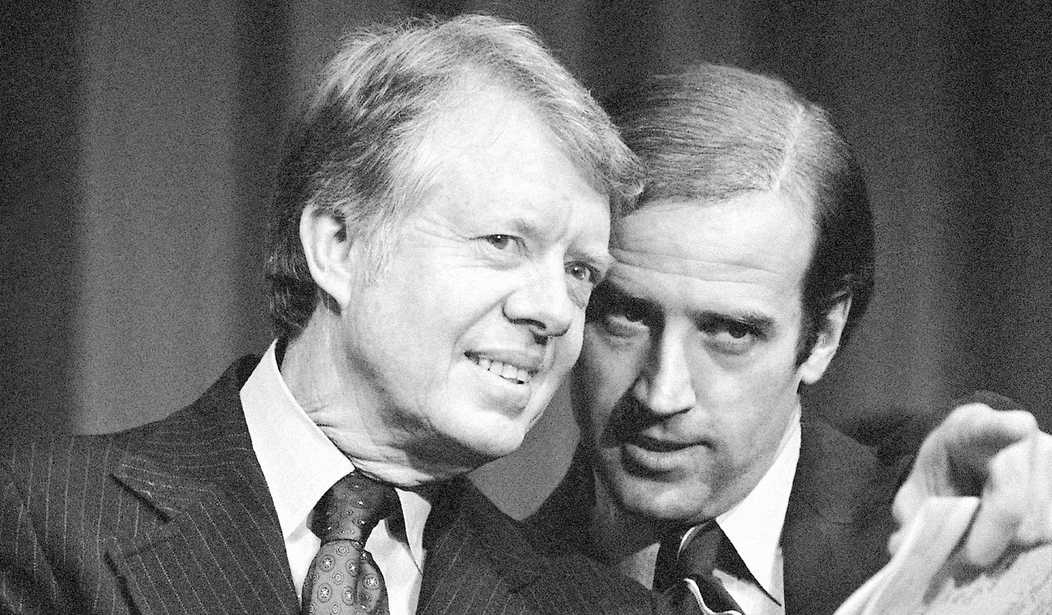Everything that is happening in our fractured nation today seems so worrisomely reminiscent of America's last lost decade -- the 1970s.
For those who don't remember, the late 1970s under part-time President Gerald Ford and then much worse under President Jimmy Carter was one economic and national security setback after another.
The witches' brew of high inflation of 7% to 10% by 1979 and ever-increasing tax rates -- which rose as high as 70% -- drove the economy into a ditch. Real family incomes cratered under Carter because inflation rose so much faster than family take-home pay. Homes became unaffordable, with interest rates on mortgages skyrocketing up to 17%. Gas prices tripled. Carter blamed "Big Oil" and "invested" in pipe-dream green energy alternatives that all went bankrupt.
Every time inflation rose, the economic whiz kids in Washington assured us the high prices were just temporary. (They didn't use the term "transitory.") When prices kept rising, Carter blamed corporate greed and installed price controls and windfall profits taxes -- which only made problems worse.
On college campuses, we saw student protesters occupying the offices of the college presidents. Race riots turned our inner cities into powder kegs.
Because America was so weak at home, our enemies abroad capitalized as Soviet tanks rolled into Afghanistan and troops into Nicaragua, while Iran held Americans hostage.
Federal spending and debt soared, and the private sector started shrinking.
Carter's response to the bad news was to point at the American people and lecture us to turn down the thermostat, put on a sweater, and learn to live with less. But even he didn't threaten to abolish air conditioning and gas heat.
The new term that slid into the American lexicon was "stagflation." This was the combination of high prices and sluggish economic growth.
Does any of this sound familiar?
President Joe Biden's prescription for the U.S. economy isn't to reverse course. It is Carterism on steroids. More price controls, higher taxes on the rich and businesses, and another $2 trillion in spending on programs like student loan "forgiveness," green energy subsidies and mortgage relief programs.
The tax rate on investment would soar well above 50%. As former Trump economist Larry Kudlow has put it, "Biden thinks he can tax America into prosperity."
On energy policy, he's doubling down on his commitment to "net zero" fossil fuel production, and will command people to buy $70,000 electric vehicles made in China.
When the vast majority of Americans say they are financially worse off, he doesn't feel their pain. He shames them for not appreciating the wonderful things he's done and the virtues of Bidenomics.
That message is a little tone-deaf given that Americans are worried about '70s-style stagflation making a comeback. Inflation is trending back up at the same time GDP growth has slowed to a 1.6% trickle.
The Biden response is Americans are unappreciative, and we are all selfish for not wanting to live with less and give up our gas stoves and SUVs in order to save the planet.
In his infamous "malaise speech" in the summer of 1979, Carter spoke of a national "crisis of confidence" and lectured Americans about too much "self-indulgence" and learning to consume less and conserve more. He even talked about "threats to democracy." Instead of inspiring the nation, he put the country in a funk.
Just like Jimmy Carter then, Joe Biden is offering four more years of austerity and sacrifice and bigger, more intrusive government. That platform won the incumbent Carter 41% of the vote in 1980.
Stephen Moore is a visiting fellow at the Heritage Foundation and a senior economic advisor to Donald Trump. His latest book is: "Govzilla: How the Relentless Growth of Government Is Devouring Our Economy."









Join the conversation as a VIP Member